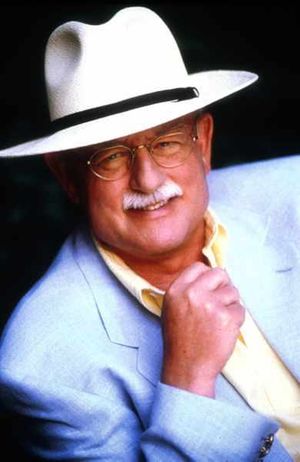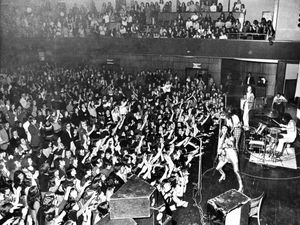Such golden years for Roger Whittaker
As Roger Whittaker celebrates 50 years in showbusiness, he talks to Mark Andrews about his Midland roots - and the Birmingham jeweller behind his biggest hit


In the summer of 1962 Roger Whittaker's life was at a crossroads. Having just graduated at Bangor University, he seemed destined for a career in academia.
But, after three years as a struggling young entertainer, he finally broke into the UK pop charts with his second single, Men of Steel.
Certainly his Staffordshire-born parents were in no doubt at all about which career path he should choose.
"My father, being a true Staffordshire man, I don't think he ever warmed to the idea of what I did at all. I think he thought I should go and get a proper job."
Despite the parental doubts, not to mention a few of his own, he decided to try for a career in music, giving himself 12 months to get the singing bug out of his system. This year he celebrates his 50th anniversary in showbusiness, and is marking the occasion with a new album The Golden Age of Roger Whittaker.
"I am so proud, to have enjoyed a career for 50 years is quite remarkable. I was destined for a career as a scientist until music got in the way."
Surprisingly, it was his academic mentor from university who convinced him that he was doing the right thing.
"I wrote to my professor from university, Charles Evans. He said 'making people happy is as worthwhile achievement as I know', and I thought if he, the man I respect most, can think that, there must be something in it."
It is fair to say that, 55 million records on, it is a decision he probably does not regret. But fame did not come overnight, and he credits Bob Dylan for doing much to open people's minds up to guitar-based folk music.
"Along came Dylan, who instead of playing rock 'n' roll was doing guitar-led folk, and there was this window of opportunity."
His unusual whistling ability raised his profile, and in 1967 he had two hits, Mexican Whistler which topped the charts in three European countries, and If I Were A Rich Man which peaked at number two.
Cracking the UK proved much harder though, and it was another two years before his melancholy Durham Town reached number 12 in the British charts. Would he have enjoyed the same commercial success had Dylan not led the way?
"It's hard to say, I think Durham Town would have done," he says, thoughtfully. "I remember being at a football match, I think it was Newcastle, and at the end of the game they played Durham Town, and I thought 'this is brilliant'."
A string of hits followed, including the upbeat New World in the Morning, and the Ivor Novello Award winning I Don't Believe In If Anymore, but it was his biggest success came in 1975 with The Last Farewell, the words of which were written by a jeweller from Birmingham.
"I had a radio series, and people used to send in words for songs. One of the ones we picked out was by Ron Webster, it was his poem called The Last Farewell.
"I think Ron made jewellery out of silver, he was a very clever fellow," says Roger. The song was initially released in 1971 and did not do as well as he had hoped, but four years later it became a big hit in the US after getting airtime on a radio station.
It then sold 11 million copies worldwide, peaking at number two in the UK.
So what became of the Brummie jeweller behind one of the biggest selling records of all time?
"We stayed in contact for a very long time," says Roger.
"He went to live in America, and he died over there. The mid-1970s were a very exciting time for him, it changed his life."
Whittaker's parents Edwin and Viola owned a grocery shop in Newcastle-under-Lyme, but the couple emigrated to Kenya for the sunnier climate after Edwin was involved in a serious motorcycle crash.
Roger, who was born in Nairobi, says his parents were always very proud of their Staffordshire roots, rebuking him if he got the geography of the area wrong. The singer also settled in the Midlands, living in Ross-on-Wye until 10 years ago, but he now lives in Ireland.
His new album features material throughout his career, including his early songs such as Steel Men and Charge of the Light Brigade which are rarely heard today.
"This album could well be the story of my life and my career and sums up everything I am, it brings back so many memories," he says.
He says while there is no shortage of musical talent around today, the lack of small venues makes it very difficult for young performers to hone their craft in the way that his generation was able to,
"I'm so happy for these singers who do well on these talent shows, many of them have wonderful voices, I love Leona Lewis. But I wonder how many of them will get the chance to become good entertainers, I wonder who is going to teach them to entertain.
"There's not the clubs there used to be where they could go along and learn how to entertain people.
"There are a lot of singers in this world, and some of them are really good, but you have to go and learn how to entertain. Look at Madonna, Sammy Davis Junior, and Johnny Cash, it's that presence that catches the audiences. But that is not something you have naturally, it is something you have to work at."





